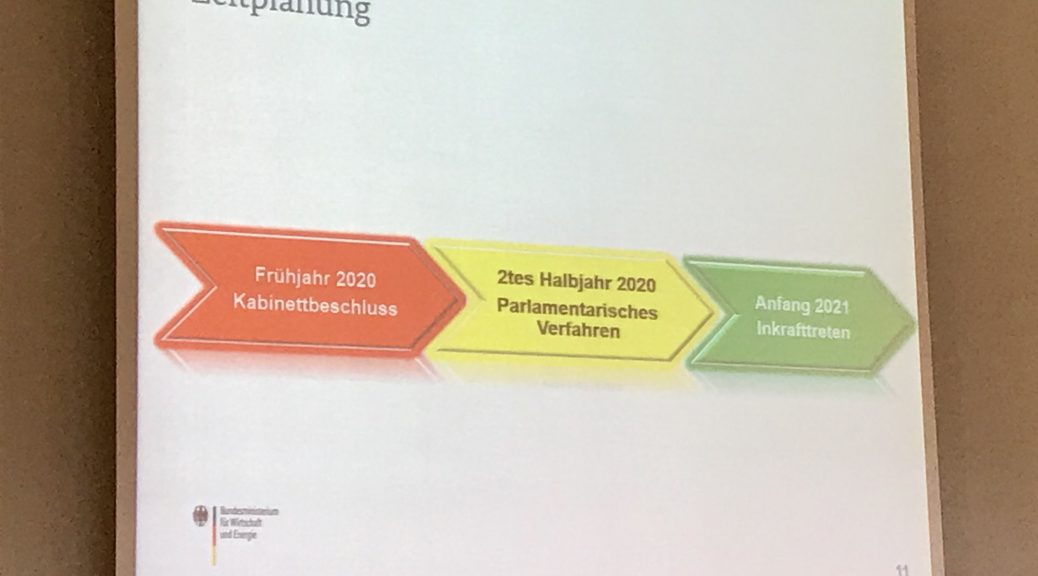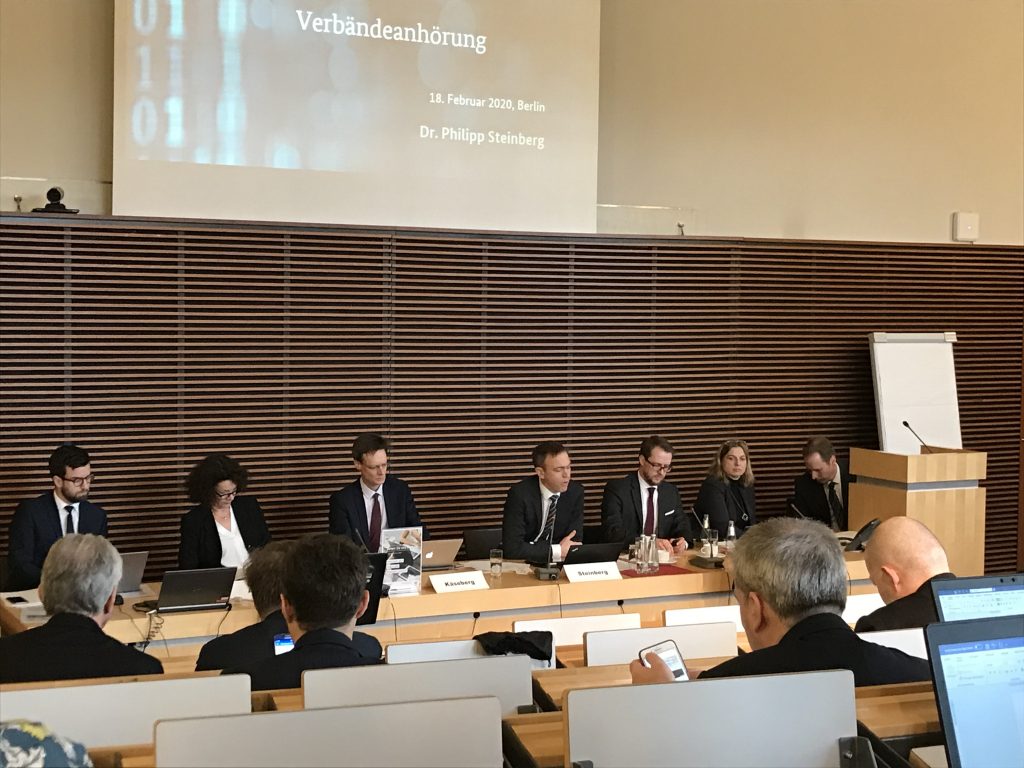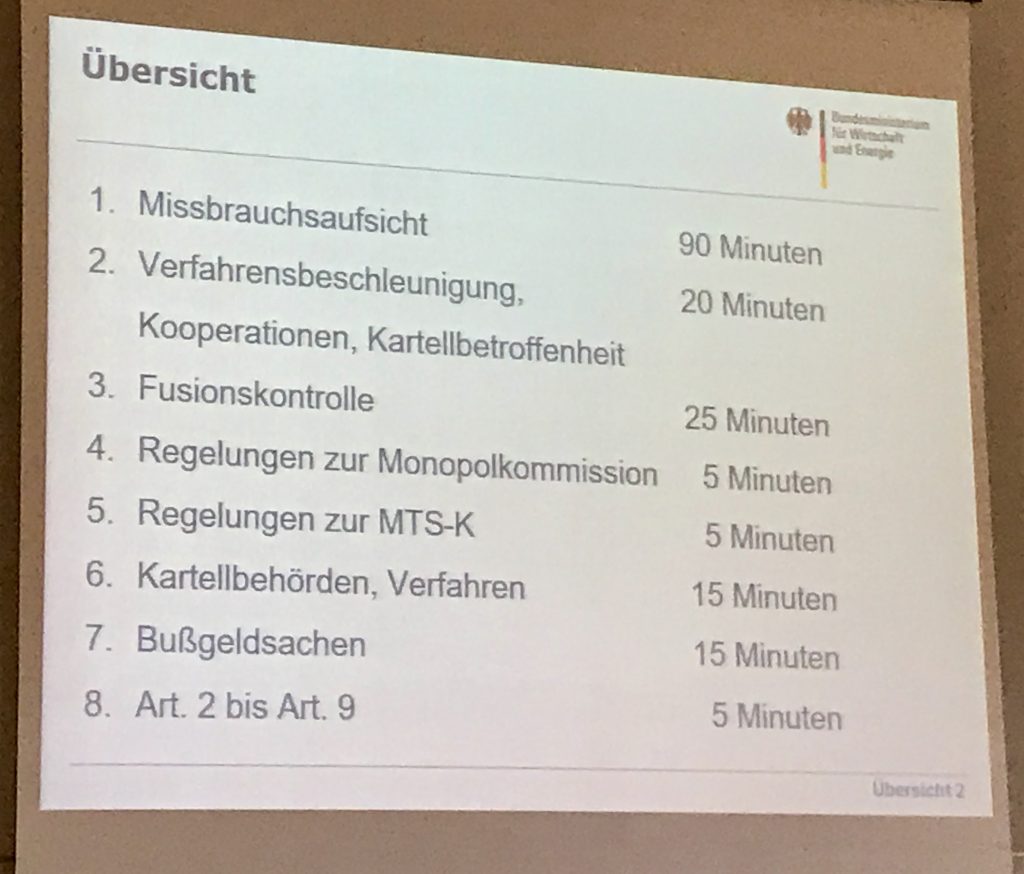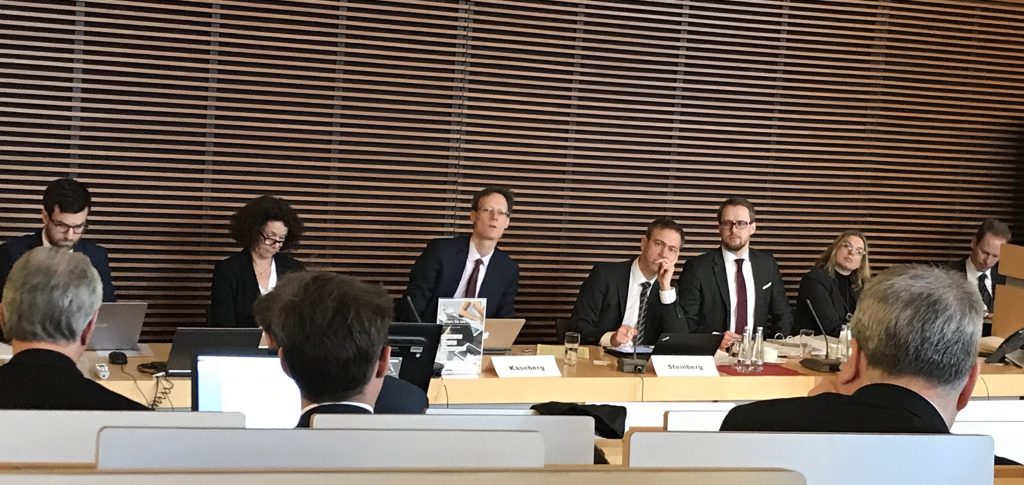
Conference Debriefing (18): GWB10-Hearing
German Ministries send their draft bills to hearings of stakeholders. Now it was the turn of the draft competition law reform that had to pass through this hellfire. Rupprecht Podszun went to Berlin to see how the Ministry fared with the representatives of industries, Google and the like…
Name of the event: Hearing on the GWB Digitisation Act (#GWB10) (“Verbändeanhörung” in German)
Place & Time: Federal Ministry of Economics and Energy, auditorium of the old Kaiser Wilhelm Academy, 18 February 2020
Host: The fathers and mothers of the 10th amendment of the German competition act (GWB) – with Dr. Philipp Steinberg, a high-ranking director in the Ministry, as a moderator
Audience: Huge! Nearly 100 lobbyists (m/f/d), including the regulars of antitrust lobbyism such as Hildegard Reppelmund (DIHK), Niels Lau (BDI) and Andreas Gayk (Markenverband), but also a colourful mix of such diverse personalities as Hausfeld’s Thomas Höppner (who was still having the joy of some of the questions of the ECJ in Google Shopping written all over his face), Christina Oelke from VAUNET, Rena Tangens from Digitalcourage, Stephan Manuel Nagel from Taylor Wessing or Markus Wirtz from Glade Michel Wirtz – to drop some random names (most of whom come from Düsseldorf but that is really pure coincidence).
100 lobbyists in one place who want to tinker with antitrust law? Sounds like a suicide mission for the authors of that draft bill!
Don’t worry too much. These lobbyists are friendly people, and they met Philipp Steinberg who hosted that in a very hands-on manner shrugging off some of the criticism. For instance, the lobbyist for German car manufacturers said that there are so many open question in the law, for instance regarding the access to data right. That would require a lot of judicial work in the aftermath of Bundeskartellamt proceedings. Steinberg, matter of fact, explained the basics of reforming rules: That’s how it is when there are new rules – new rules, new terms, new questions.
So, what do stakeholders think of the draft?
Stating the obvious: Sabine Frank of Google did not really seem to be enthusiastic, remember, please, that Germany intends to introduce a tougher regime for GAFAs; the German start-up association is afraid of the new section 39a of the act that proposes new merger notification thresholds for certain companies (mainly targeting German regional markets, but possibly also catching some start-ups); everyone thinks it’s great that – apart from that rule – the thresholds of merger control are being raised; and that in future you should be able to get a declaration from the Bundeskartellamt that it sees no reason to take action in cases of co-operations – even though it was suggested that that should be extended to all co-operations, not just those of competitors.
But there was even more cheering. Berlin was, of course, from a Rhineland perspective, stormy and drizzly as usual. But inside that packed auditorium there was a nice warm summer breeze at times for the authoring team of the draft bill. Thorsten Käseberg, head of the competition department in the Ministry, sat facing the audience with Philipp Steinberg and his staffers Tobias Brenner, Annett Arlt, Daniel Fülling, Maja Murza and Tobias Glass. At the beginning, Steinberg had labelled the reform a “Gesamtkunstwerk”, something like a masterpiece, that is following a certain “philosophy”, and I was not really able to figure out whether he really meant it or was joking a bit.

But they earned much praise?!
Ulrich Herfurth from the association of family-run businesses “Die Familienunternehmer” was the first to congratulate them on this pioneering act. Alexander Barthel from the German Confederation of Skilled Crafts (Zentralverband des Deutschen Handwerks) made it clear in no time at all why companies need data access and how skilled crafts companies are worried about losing the customer interface: “Can we communicate via the display – or is someone else picking this up?” The association of small and medium-sized enterprises, “Mittelstandsverbund”, the media and newspaper trade associations, consumer organisation VZBV and also online retailer Zalando (Anselm Rodenhausen: “this could be one of the first fashionable trends from Germany that set an international example”) were impressed. Having said, you never get it unrestrained: “That’s an excellent reform – and a not quite so excellent letter, that your Minister sent with his colleagues to Mrs. Vestager”, Peer Robin Paulus from Familienunternehmer said. Peter Altmaier, the German Minister, had teamed up with his colleagues from France, Poland and Italy, and had recently written to the Commissioner for Competition and urged her to please come up with some reforms soon. It was pointed out that it does not make sense to be tougher on the German level and to relax rules at EU level at the same time.
Yeah, a European solution surely is much better, isn’t it?
Of course! But as long as the EU cannot or will not act, the call for the international level is simply an attempt to prevent any new rules. Mark Zuckerberg has already been touring government offices with a call for international reform – knowing full well that the best thing that could happen to him would be to set up an international working group that would meet for a few years and then to sink into oblivion – see the Financial Transaction Tax. Steinberg stressed that the draft was in some respects closely aligned with the British Furman Report and that the friends from France were cooperating closely on these issues anyway. The EU will present its agenda for digital issues today, including competition law, but Germany definitely is a step ahead. Incidentally, since we are talking EU law here: The draft bill deprives the Länder cartel authorities of their competence to apply EU law. That is the price to be paid for the ECN plus requirements.
What did BDI, that industry association, say? It was my understanding that they are in charge in Germany.
Ha-ha, yes, that’s a fine subject. BDI said: Nothing. Representative Ulrike Suchsland opened her statement by saying that unfortunately the BDI is not able to speak on the issues of abuse control since internal coordination has not yet been completed.
Whut? That draft had already been around for months! Do they not follow you’re your blog at BDI?
For me, this was the disappointment surprise of the day, and if I were pessimistic, I would interpret a lot more into that regarding the abilities of German industrial powers to play digital – or at least to play politics. For months, or, for years we have been discussing how the European economy can hold its own against the Silicon Valley giants, and then the Ministry comes up with a broad pitch on shaping policy in the digital age – and the most important German business association goes into the hearing without being able to say a word on this. I understand they will submit a statement later in the process, but as a person who cares about the welfare of the European economy, I have the feeling that industry lacks a vision. That worries me, to be frank. The GAFA companies paralyse some of the associations (such as Bitkom, the association of IT companies) with their sheer membership, and they show up themselves in such hearings with their lobbyists, yet German top companies remain silent. The BDI limited itself to general comments that B2B platforms should not be restricted too heavily and that access to data may be a somewhat problematic thing. Bitkom’s Rebekka Weiß did at least make the point that the eligibility of data access claims could be reconsidered. Steinberg: “And your opinion on the regulatory proposal in section 19a?” – “None yet.” – “See, we must always have an opinion.” Well, at Bitkom, Google & Co. are sitting at the table with friends, frenemies and enemies.
I read that Amazon recently joined the German retailers’ association HDE.
I read that too, and somehow I had this picture in my head of lambs voluntarily inviting the wolf into their herd. In any case, Peter Schröder of HDE could not have put his statement into more amazonistic tones – there is no need to change the law on abuse, there is a threat of over-regulation. The lowering of intervention requirements for interim measures is wrong. Incidentally, the BDI was also in a position to speak on the latter matter, and also urged that the rights of defence under the rule of law should not be thrown overboard in the case of interim measures. Ulrike Suchsland said that if the problem was that Bundeskartellamt needs to speed up, it would be better to strengthen its resources. Andreas Mundt will probably second her on that!

Apart from abuse control, what was the focus of attention?
Merger
control, of course. Here the devil is in the details: the bundling of minor
markets could ruin the joy of raising the thresholds. The so-called Remondis rule in section 39a, which
apparently slipped into the draft bill only at the last minute, will certainly
be discussed again – or tailored more precisely to capture what the
Bundeskartellamt is aiming for. And, oh wonder, all business associations would
be pleased if the merger notification thresholds were even higher and were regularly
placed at higher levels reviewed.
Surprisingly, the ministerial approval, this particular feature of political interference with prohibitions by the Bundeskartellamt, was also briefly discussed. This was probably due to the fact that on the day before the hearing there was an article on this in a leading German newspaper. I spare you the details.
Never mind! Anything else?
Very little was said about the new fining laws and procedural adjustments in the wake of ECN plus. Bitkom proposed to delete fines for individuals in German law (that we have other than on EU level); the BDI wanted more far-reaching legal privilege. And Facebook, that most benign caretaker of personal data from Menlo Park, warned that access to data obligations should not run counter to privacy. Um, yeah, um…
Hihihi. Was there any lobbying where you thought: they know their job?
Absolutely! In one part of the amendment that I had never really looked at, section 47k, the Ministry wishes to introduce an obligation for petrol stations to report the amount of fuel they sell. At present they already need to live stream their prices to the Bundeskartellamt that in turn enables apps to inform you where you find the cheapest petrol station around. The representatives of this trade needed no more than three sentences or so to make it abundantly clear that further duties to report are completely out of proportion.
They have all my compassion… What do we take from this event of the 100?
With so many who have a say, opinions are neutralizing each other: Some want to sharpen up section 19a, others want to get rid of it. Some celebrate this, others hate that. The associations representing the German Mittelstand were very supportive, the associations of the big ones were rather undecided, and Google & Facebook have few voters in Germany. If the law is now being tweaked, then, in my cautious assessment, the merger control thresholds in section 39a and the data access claims are most likely to be looked at, but more in nitty-gritty details. The general line seems to hold. And, of course, the Ministry may think about that petrol station bureaucracy again!

What next?
The hearing brought the discussion out of the back rooms and legitimised it in public – now we know from each other where we stand, what alliances we can forge, what the Ministry has as homework. Today, it’s the Länder being heard, a good tradition in German federalism, and also, so is my understanding, the famous Studienvereinigung Kartellrecht will discuss a lengthy opinion concerning the more doctrinal legal issues with Thorsten Käseberg and his team. By the way, on his computer, the logo of a well-known GAFA company was shining brightly, so maybe not all is lost for the friends from the Valley. When the Ministry of Economics has the final draft, it goes to the cabinet and becomes an official government draft. However, it was stated that the parliamentary procedure is only scheduled for the second half of 2020. For my taste, this could be more ambitious, nowadays you don’t even know who will be in which office next week in Germany…
Steinberg summed it up: “We didn’t succeed in doing this completely not-good.” Linguistically this could probably be expressed less not-good, but in substance he has a point.
Do say: “We do not want industrial policy in EU merger control, I say this quite clearly.” (Dr. Philipp Steinberg, BMWi)
Dialogue of the day: “Now the lady in the middle of the room… from the middle, I would expect a statement that this is a good compromise!” (Steinberg) – “I’m from Google.” (Sabine Frank)
4 thoughts on “Conference Debriefing (18): GWB10-Hearing”
Vielen Dank für die Zusammenfassung!
Zu den Landeskartellbehörden: Ich würde annehmen, dass in einigen Ländern die geforderte Unabhängigkeit de facto schon besteht, insbesondere dort, wo die Landeskartellbehörde wie die Landesregulierungsbehörde organisiert ist. In vielen Ländern wären aber organisatorische Anpassungen notwendig.
Wenn es bei der geplanten Änderung bleibt (ich bin gespannt, wie die Länder sich dazu positionieren), wird sich die deutsche Kartellrechtspraxis auf jeden Fall etwas eingehender mit Art. 3 Abs. 1 EU-VerfVO beschäftigen müssen als bisher.